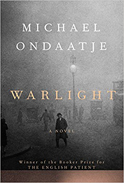
 |
Warlight
by Michael Ondaatje
Knopf
War never ceases. Even during ceasefire, war goes underground and waits for a chance to reemerge. During active war, nothing comes off cleanly, and rules are bent if not entirely broken. This uncertainty requires people to reevaluate what is important and what to preserve for the future. The intensity forces people to change. It places them out of position and off the beaten paths of their lives. On the largest scale, war is about power, but when the dust clears, all war is personal.
In Ondaatje’s latest novel, war is the landscape, but it is not the story. The book centers on Nathaniel or “stitch” as his mother dubs him. It is WWII in England, and it’s important to have an alias, because business can be secret, serious, and at times desperate. As the story unfolds, Nathaniel’s mother, Rose, and his father, who is a lesser figure in his life and not a focus of the story, disappear from the house, which leaves him and his sister under the care of shifty associates of their parents. His parents have said their good-byes, but it soon becomes evident that their reasons for leaving are false. The children are left without answers and to a large extent left to their own devices.
Their caretakers mean well and in fact serve as adult role models, but they are criminals and con men. The children become “that family” that exists in every neighborhood, where they don’t seem to have guidance, don’t seem to operate by common rules, and one wonders what the inside of their house looks like, but rarely gets to glimpse. The author provides glimpses. The house becomes a pass-through for a unique assortment of characters, who unbeknownst to the young Nathaniel, are playing parts in a larger scheme to keep the country safe.
Recently Ondaatje has become fascinated with the viewpoint of a child, which for most is a benign and limiting time in one’s life. True enough, Nathaniel is missing his parents and in some sense a childhood, which is compelling. The events that surround him are often grim and full of wonder, but however great the events of one’s youth might be, a child’s capacity to interpret it, even though fiction, is slim. It takes the adult Nathaniel, who arrives later in the story but sits somewhat as a narrator throughout, to make sense of the past. He searches through government archives and his distorted memories, because all of our childhood memories are unreliable, to locate his now-deceased mother. In Ondaatje quilt-work style, Nathaniel pieces together a story, or at least the reader does through the various perspectives and characters that compose Rose’s life. The trouble is that every character in the story is much more interesting than the narrator. In the end, Nathaniel finds that by a twist of fate he is somewhat like his mother. These discoveries will be personal, like the lingering effects of war.
It takes awhile for Ondaatje to find his lyrical prose, and he only slips in and out of it, concerned more with the storytelling than previous ventures. Like John Irving, Ondaatje loves dividing the then and the now—the lingering effects of inescapable events in the past. He might make a case for us humans that it is only those past traumas that we recall with clarity, and everything else becomes fuzzy over time. We gain attachment to them. We use them as signposts and watermarks. We forever attempt to define them.
Next Focus Review
Previous Focus Review